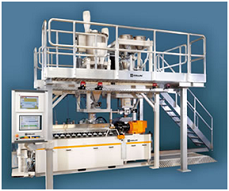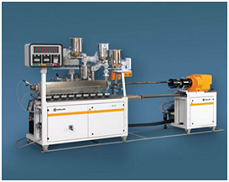COLLIN
***************************************************************************************************************************************************
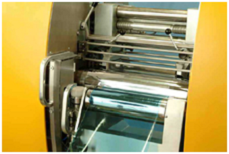
Roll Mills
Collin® laboratory roll mils are machines intended for discontinuous mixing, kneading and plasticizing. These are important processing operations that can be used to test the quality and processability of plastics and elastomers . Whether commodity resin, high-temperature material or other specialty such as a ceramic formulation – roll mills from Collin® set the standard for precision and reliability.
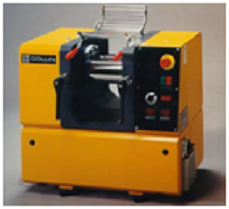
Bench-Top Roll Mill
Type W 100 T
Bench-top roll mills are designed for testing small batches. The primary users are research and educational institutions as well as industry. Rolls are 100 mm in diameter with a width of 120 mm. Batch weights up to 50 g can be processed.. As a down-stream take-off device, they are ideal for finishing extruded film.
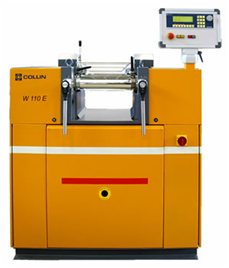
Testing Roll Mills
Type W 110 EP and W 150 EP
Testing roll mills from Collin® are used primarily for routine testing in industry. Leading manufacturers of PVC, polyolefins , compounds, pigments and masterbatches use these high-quality mills to ensure the quality of their products . These machines also find regular use in production of high-quality plastic products.
Type W 110 AP and W 150 AP
Automatic testing roll mills from Collin® are especially useful when maximum reproducibility of test results is required. Auto- matic processing ensures that results are independent of the operator.
Type W 110 G and W 150 G
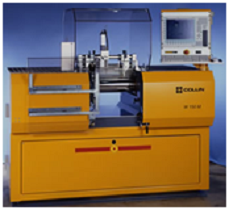
Testing Roll Mills and Elastomer Roll Mills
Type W 150 M, W 200 M and W 250 M
These high-quality testing roll mills from Collin® are character- ized by their very sturdy construction. This provides the basis for precise and reproducible process parameters. An ergonomic touch screen control system regulates the process, records the process parameters and offers a variety of options for evaluat-ing the data collected. This makes the machine indispensible when developing high-performance resin formulations today.
Type W 150 MG, W 200 MG
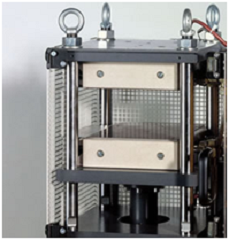
Platen Presses
Laboratory platen presses are employed to produce film or sheet from all types of polymers. These are then used to prepare test specimens to investigate mechanical, electrical, chemical or optical properties of the polymers. In addition to high-precision mechanical construction, Collin® presses offer highly accurate temperature control in conjunction with high heating and cooling rates. State-of-the-art controls combine maximum ease of operation with precise control of all process parameters and a variety of data processing options.
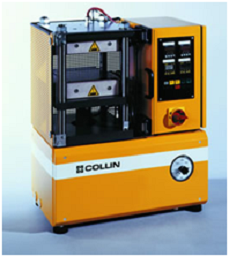
Bench-top Presses
P 200 E, P 300 E and P 400 E
Bench-top platen presses are the right choice when only small test specimens are available. For simple applications, the Type P 200 E represents an economical version.
These presses can also be equipped with cooling cassettes.
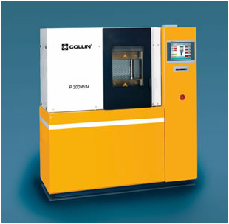
Testing Presses
Type P 200 P/M, P 300 P/M, P 400 P/M, P 500 P /M
Precise control of selected parameters, especially thickness and temperatures, combined with intelligent sequencing, permits reproducible preparation of test specimens. Numerous special function such as: Cassette cooling system for rapid cooling Temperature and pressure rampsLow-pressure systems
High-speed feeding
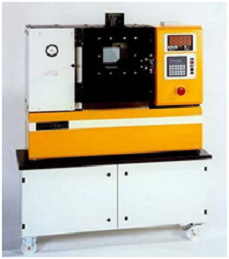
Vacuum Presses
Type P 200 MV, Type P 300 MV
Numerous materials are sensitive to oxidation processes. Under certain circumstances, this sensitivity may be critical, especially at elevated temperatures or in the event of long pressing times, and result in undesirable material degradation. It is also often necessary to prevent formation of entrapped gases in the test specimen. Such cases require the use of vacuum presses, where the entire press mechanism is enclosed in a vacuum chamber.
Co-rotating Twin-Screw Extruders
COLLIN ® twin-screw extruders are used for develop- ment , compounding and production of polymer formulations of all kinds. A wide variety of processes can run on these machines:
- Dispersion of pigments
- Incorporation of fillers and additives
- Incorporation of fibers
- Blending of polymers and pastes
- Outgassing of volatile components
- Continuous reaction extrusion
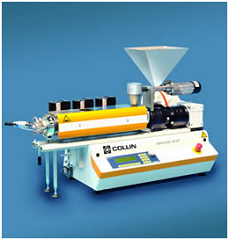
Bench-top Co-rotating Twin-Screw Extruders
Type ZK 25 T
This miniature COLLIN ® twin-screw extruder has been designed for bench-top use. The processing unit has an L/D ratio of 18:1. The screws feature modular construction and are assembled from individual elements with different pitches and lengths as well as different configurations (e. g. closely intermeshing, open lengthwise and crosswise, mixing and shear elements). Available barrel elements include a feed segment 6 D long with intensive water cooling, a vented segment 6 D long, electrically heated and aircooled, and a non-vented segment 6 D long The barrel elements rest on a movable support. This support may be moved by hand and facilitates quick cleaning of the processing unit when materials are changed frequently. Depending on the material, throughput ranges from 0.3 to 4 kg/h.
Co-rotating Twin-Screw Extruders
Type ZK 25 and Type ZK 35
The unique features of these COLLIN ® twin-screws extruders include:
- C – clamps for quick opening of the processing unit
- Motorized retraction of the barrel
- Throughput range of 3 to 30 kg/h (ZK 25) and 5 to 70 kg/h (ZK 35)
The recommended processing lengths are 36D to 48D for the smaller machine and up to 56D for the ZK 35. With an appropriate barrel configuration, the following gravimetric metering arrangement is possible:
- Primary feeding of two different pellets
- Side stuffer for powdered fillers

